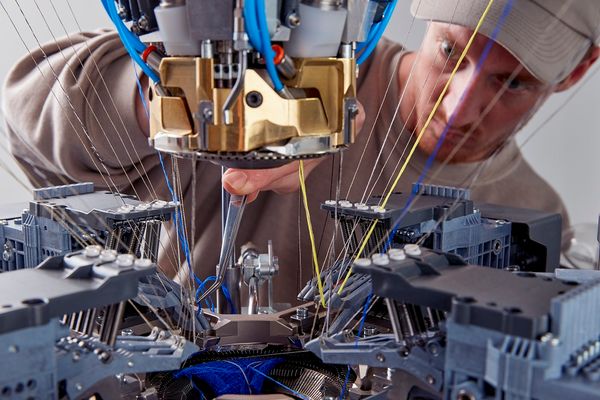Sheffield Hallam welcomes first start-up to its £900k Wellbeing Accelerator programme





Sheffield Hallam University’s Advanced Wellbeing Research Centre (AWRC) has welcomed the first start-up business to its £900,000 Wellbeing Accelerator programme.
Footfalls & Heartbeats, a Nottingham-based intelligent textiles business, will access state-of-the-art laboratories, business support packages and specialist facilities to help bring its products to market and improve people’s quality of life.
Based at Sheffield Hallam’s new world-leading £14m research centre, start-up businesses on the programme have access to world-class research and development that allows for rapid prototyping, precision engineering, laboratories for product testing, support networks and a clinical research centre.
The programme works with start-ups, SMEs, founders and agencies to accelerate the development of health and wellbeing technologies and applications. These innovations have become increasingly important this year as people adapt their lifestyles to the social restrictions triggered by the coronavirus pandemic.
Footfalls & Heartbeats has patented a technique in which sensors are knitted directly into textiles. The technology can be applied to compression bandages, wound care, injury rehabilitation, baby monitoring and performance monitoring textiles for athletes. The start-up has joined the Accelerator to validate its sensors against gold standard techniques and network with more than 30 mentors associated with the programme.
Simon Butler, Head of the AWRC Wellbeing Accelerator, said: “We are thrilled to be launching the Accelerator programme and couldn’t have got off to a better start than accepting Footfalls & Heartbeats, which is such an innovative company, as the first participant. We look forward to accepting applications from many other innovative companies in the coming weeks and months.”
Simon McMaster, Founder and Chief Science Officer at Footfalls & Heartbeats, said: “We are incredibly excited about the opportunity to have access to world-class scientists and facilities at the AWRC to validate our novel technologies. We see validating our technology as a vital step in our product and application development process and, hopefully, the programme will allow us to bring affordable healthcare to the world sooner.”
Dr Dave Smith, Chief Executive of the Sheffield City Region, said: “The Sheffield City Region is a hotbed of innovation and we are incredibly proud of our world-leading medical technology and research. We are delighted to welcome Footfalls & Heartbeats to the region. They will be the first of many firms to benefit from a unique partnership, which gives companies the business support, facilities and expertise they need to grow.
“Our partnership with Sheffield Hallam University and businesses not only unlocks productivity and prosperity, it is helps create products and services which improve people’s lives. The coronavirus pandemic shows why these are needed now more than ever.
“This new world-class business accelerator is exactly what the Sheffield City Region needs to help drive economic growth and will help South Yorkshire become a magnet for innovators and investors.”
Due to Covid-19 restrictions, the first phase of the Accelerator programme will be delivered virtually, with technology used to provide mentoring and consulting support. The second phase follows later in the year and will see small cohorts of businesses attending a series of intensive one-week onboarding sessions, followed by several weeks of further support.
The Wellbeing Accelerator at the AWRC is one of 20 University Enterprise Zones (UEZs), launched with a £20 million investment delivered by Research England, part of UK Research and Innovation.
The Accelerator's aim is to increase the likelihood of, and reduce the timescales for, innovations to be brought to market through a period of intensive testing and development.
The AWRC, which forms the centrepiece of the Sheffield Olympic Legacy Park, is dedicated to improving the health and wellbeing of the population through innovations that help people move. Its mission is to prevent and treat chronic disease through co-designed research into physical activity – whilst also attracting new jobs and investment to the region.